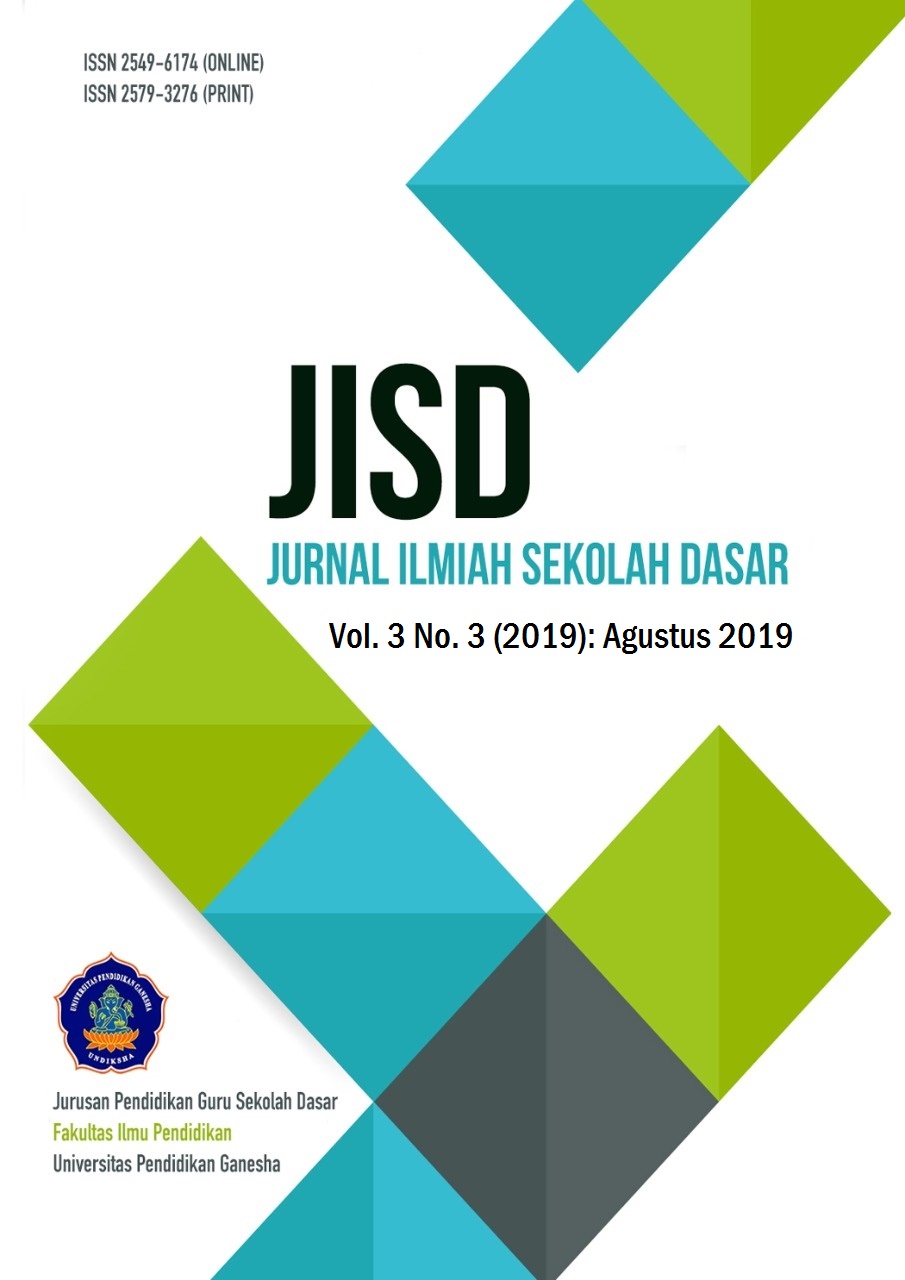Pengaruh Gaya Kepemimpinan Transformasional dan Kepuasan Kerja terhadap Kinerja Guru Sekolah Dasar
DOI:
https://doi.org/10.23887/jisd.v3i4.21782Keywords:
kepemimpinan, guru, kepuasan, kinerja.Abstract
Gaya kepemimpinan transformasional dan kepuasan kerja berpengaruh terhadap kinerja guru sekolah dasar, dengan kememinminan yang baik akan membaut suasana temoat kerja ebih baik. Penelitin ini bertujuan untuk mengukur pengaruh kepemimpinan transformasional kepala sekolah dan kepuasan kerja guru terhadap kinerja guru sekolah dasar di kecamatan Tobelo Tengah. Penelitian ini menggunakan metode survey dengan jumlah sampel penelitian sebanyak 52 orang guru. Hasil penelitian menunjukkan bahwa 1) Gaya kepemimpinan transformasional kepala sekolah berpengaruh positif terhadap kinerja guru dengan nilai thitung = 3.945 > ttabel = 2.010 pada taraf signifikan 0.05. 2) kepuasan kerja guru berpengaruh positif terhadap kinerja guru dengan nilai thitung>ttabel yaitu 3.049 > 2.010 pada taraf signifikan 0.05. Dan 3) gaya kepemimpinan kepala sekolah dan kepuasan kerja bersama-sama berpengaruh positif terhadap kinerja guru SD di Kecamatan Tobelo Tengah, dengan kontribusi sebesar 0.437 atau 43.7%. Jadi dapat dikatakan bahwa gaya kemimpinan transformasional terhadap kinerja guru sekolah dasar , dimana gaya ini akan membuat suansana lebih nyaman.
References
Andreani, F., & Petrik, A. (2016). Employee Performance as The Impact of Transformational Leadership and Job Satisfaction in PT Anugerah Baru Denpasar. Jurnal Manajemen Dan Kewirausahaan, 18(1), 25–32. https://doi.org/10.13189/ujm.2016.040404
Aprilyanti, S. (2017). Pengaruh Usia dan Masa Kerja Terhadap Produktivitas Kerja (Studi Kasus: PT. OASIS Water International Cabang Palembang). Jurnal Sistem Dan Manajemen Industri, 1(2), 68. https://doi.org/10.30656/jsmi.v1i2.413
Arifin, Z. (2014). . Evaluasi Pembelajaran: Prinsip Teknik Prosedur. PT Remaja Rosdakarya.
Bass, B. M., & Riggio, R. E. (2006). Transformational leadership (2nd ed.). Lawrence Erlbaum Associates.
Garcia-Morales, V. J., Llorens-Montes, F. J., & Verdu-Jover, A. J. (2008). The effects of transformational leadership on organizational performancethrough Knowledge and Innovation.
Keating. (1986). Kepemimpinan. Teori dan Pengembangannya. (terjemahan; A.M. Mangunhardjana). Kanisius.
Kovjanic, S. Schuh, S. C.,& Jonas, K. (2013). Transformational leadership and performance: An experimental investigation of the mediating effects of basic needs satisfaction and work engagement. Journal of Occupational and Organizational Psychology, 86(4), 543–555. https://doi.org/https://doi.org/10.1111/joop.12022
Levy, P. E. (2010). Industrial organizational psychology; understanding the workplace (3rded.). Worth Publisher.
Saleem, H. (2015). The Impact of Leadership Styles on Job Satisfaction and Mediating Role of Perceived Organizational Politics. Procedia - Social and Behavioral Sciences, 172, 563–569. https://doi.org/10.1016/j.sbspro.2015.01.403
Siregar, F. A. (2019). Peningkatan Kompetensi Kepala Sekolah Dalam Upaya Meningkatkan Mutu Pendidikan Oleh: IJTIMAIYAH, 2(1).
Suwarni. (2011). Pengaruh Gaya Kepemimpinan Kepala Sekolah dan Budaya Sekolah terhadap Kinerja Guru. JURNAL PENDIDIKAN DAN PEMBELAJARAN, 18(2).
Werang, B. R. (2014). Teachers ’ Work Morale , and Teachers ’ Work Satisfaction on Teachers ’ Work Performance At State Primary Schools. Cakrawala Pendidikan, 128–137.
Downloads
Published
How to Cite
Issue
Section
License
Authors who publish with the Journal Ilmiah Sekolah Dasar agree to the following terms:
- Authors retain copyright and grant the journal the right of first publication with the work simultaneously licensed under a Creative Commons Attribution License (CC BY-SA 4.0) that allows others to share the work with an acknowledgment of the work's authorship and initial publication in this journal.
- Authors are able to enter into separate, additional contractual arrangements for the non-exclusive distribution of the journal's published version of the work (e.g., post it to an institutional repository or publish it in a book), with an acknowledgment of its initial publication in this journal.
- Authors are permitted and encouraged to post their work online (e.g., in institutional repositories or on their website) prior to and during the submission process, as it can lead to productive exchanges, as well as earlier and greater citation of published work. (See The Effect of Open Access)










